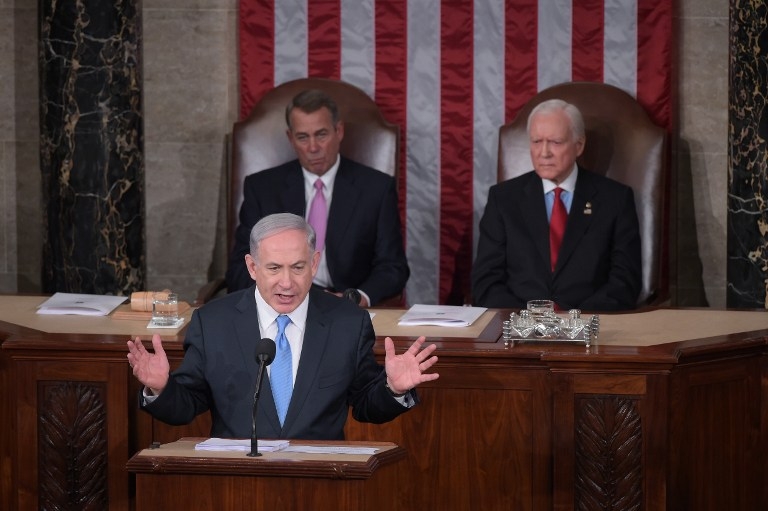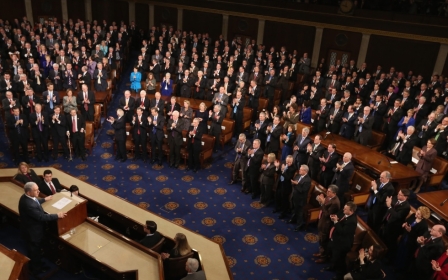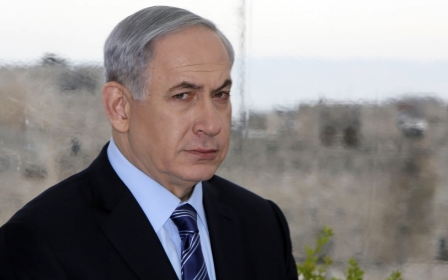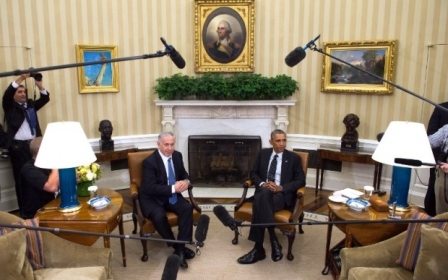Netanyahu brushes off Obama criticism of Iran speech

Israeli Prime Minister Benjamin Netanyahu on Wednesday brushed aside criticism from US President Barack Obama of his speech to Congress, in which he warned that Washington was paving the way to a nuclear-armed Iran.
The White House was infuriated by Netanyahu's address on Tuesday to a joint session of the US Congress, where he laid out Israeli concerns at an emerging world deal with Iran on its nuclear programme.
Obama, who refused to meet Netanyahu during his 48-hour visit to Washington, dismissed the speech as containing "nothing new," saying the Israeli leader "did not offer any viable alternatives".
Netanyahu, however, insisted on Wednesday that he had "presented a practical alternative, which would impose tougher restrictions on Iran's nuclear programme, extending Iran's breakout time by years.
"I also called on the P5+1 (world powers negotiating a nuclear deal with Iran) to insist on a deal that would link the lifting of those restrictions to Iran's ceasing its sponsorship of terrorism around the world, its aggression against its neighbours and its calls for Israel's destruction," he said on his return to Israel.
The Israeli leader also cited "encouraging responses from both Democrats and Republicans" to his address.
"They understood that the current proposal would lead to a bad deal and that the alternative is a better deal," said Netanyahu.
But clearly not all US politicians were so encouraging. In a statement, Democratic leader Nancy Pelosi called his speech "an insult to the intelligence of the United States."
"As one who values the US-Israel relationship, and loves Israel, I was near tears throughout the Prime Minister's speech," she said, adding that she was " ... saddened by the condescension toward our knowledge of the threat posed by Iran and our broader commitment to preventing nuclear proliferation."
Iran's foreign ministry spokesperson Marzieh Afkham called the speech "boring and repetitive".
“Netanyahu’s lie-spreading campaign against Iran’s peaceful nuclear programme has become boring and repetitive,” state-run news agencies quoted Afkham as saying. “The speech by the Zionist regime’s prime minister was a piece of deceitful theatre which is part of the hardliners’ election campaign in Tel Aviv."
Israel believes Iran and world powers are likely to reach a deal that eases international sanctions on Tehran without applying sufficiently stringent safeguards to stop it developing nuclear weapons.
Netanyahu's address came just four weeks before a 31 March target for a framework deal, and two weeks before a 17 March general election in Israel in which Netanyahu is hoping to win a third consecutive term in office.
New MEE newsletter: Jerusalem Dispatch
Sign up to get the latest insights and analysis on Israel-Palestine, alongside Turkey Unpacked and other MEE newsletters
Middle East Eye delivers independent and unrivalled coverage and analysis of the Middle East, North Africa and beyond. To learn more about republishing this content and the associated fees, please fill out this form. More about MEE can be found here.




